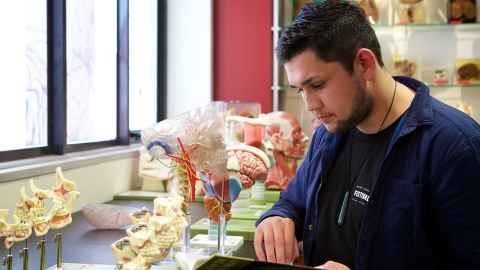BSc subjects taught at FMHS
Using both campuses and their resources, you can now study a Bachelor of Science majoring in Biomedical Science, Pharmacology or Physiology.

Due to the close relationship between the field of science and medicine, we work with the Faculty of Science to bring you the best of both worlds.
Bachelor of Science (BSc) majoring in Biomedical Science
The Biomedical Science programme is designed for students with an interest in the emerging areas of basic medical science, such as genomics, microbiology and neural science, and its applications to improve human and animal health.
The undergraduate Bachelor of Science (BSc) in Biomedical Science degree is an interdisciplinary specialisation within the BSc programme.
Classes are co-taught by the Faculties of Science and Medical and Health Sciences, with lectures split between the City and Grafton Campuses.
Find more information on Biomedical Science (BSc), contact the Faculty of Science.
Bachelor of Science (BSc) majoring in Pharmacology
Modern pharmacology developed from the concept that particular chemicals are biologically active and can be used to modify, cure or prevent illness. In practice, this requires a detailed understanding of both how the body functions (physiologically and biochemically) and the problems which can occur (functional disturbances and pathology).
By determining cellular and chemical abnormalities of the disease state, it is at least theoretically possible to design molecules to correct problems that arise.
Pharmacology classes are co-taught by the Faculties of Science and Medical and Health Sciences, with lectures split between the City and Grafton Campuses.
For more information, visit the Faculty of Science Pharmacology.
Bachelor of Science (BSc) majoring in Physiology
Physiology is the study of how living organisms function from cell to whole body. Understanding how organisms work helps us to understand what goes wrong in disease, and provides a rational scientific basis for its treatment. Physiology is highly quantitative and has close links with biochemistry, molecular biology, mathematical modelling and pharmacology, as well as zoology and neuroscience.
Physiology is a strong research focussed department offering world-class research inspired teaching connecting basic biology with biomedical and bioengineering fields in many physiology topics including cardiovascular, respiratory, renal, vision and hearing, neuroscience, fetal and neonatal, cellular and molecular, and endocrinology. Our students graduate well equipped with expertise and knowledge that will allow them to take up diverse opportunities in research, clinical medicine and industry.
As a physiology student, you will take courses in Biological Sciences, Chemistry, Medical Science, Physics and Statistics to give you a solid quantitative grounding and to encourage critical thinking, science innovation and translation. As part of your physiology major you’ll complete a capstone course, PHYSIOL 399, where you’ll demonstrate your knowledge and skills through the design of a scientific research project. You will explore the role of science and scientists in society, ethics, science communication, and commitment to Māori and Pacific health advancement.
Complementary majors include Biological Sciences, Chemistry, Exercise Sciences, Mathematics, Pharmacology, Physics, Psychology and Statistics